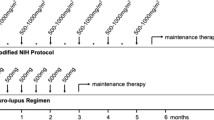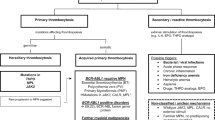Abstract
Background
Between 5 and 50% of atypical hemolytic uremic syndrome (aHUS) cases in children are caused by autoantibodies against complement factor H (CFH). Given the acquired autoimmune nature of the disease, plasma exchange (PE) and various immunosuppressive treatments have been used. More recently, eculizumab has been proposed.
Methods
In this multicenter, retrospective study, we report outcomes of 12 children with anti-FH antibody-associated HUS treated with eculizumab associated with various immunosuppressive regimens.
Results
Patients were treated with eculizumab for 15.5 [9.5;23.0] months and 3 received PE or IgG adsorption. Three patients received mycophenolate mofetil (MMF) alone, 1 patient received MMF and steroids, 1 patient received MMF and rituximab, 3 patients received MMF/steroids and rituximab, and 4 patients did not receive any immunosuppression. Anti-FH antibody levels significantly decreased but no difference was observed based on the immunosuppressive regimen. Eculizumab was discontinued in 7/10 patients after 11 [7.5;15.5] months and MMF in 6/8 patients after 36 [35;40] months. Anti-FH titers at MMF discontinuation ranged from 257 to 3425 UI/L. None of these patients relapsed and eGFR at last follow-up was above 70 mL/min/1.73 m2 in all patients.
Conclusions
Eculizumab is effective and safe in inducing and maintaining remission in aHUS secondary to anti-FH antibodies and renders reduction of anti-FH titers less urgent. Anti-FH antibody titers decreased in most patients irrespective of the immunosuppressive treatment chosen, so that a strategy consisting of combining eculizumab with MMF monotherapy seems sufficient at least in non-Indian or less severe forms of anti-FH antibody-associated HUS.
Graphical abstract

A higher resolution version of the Graphical abstract is available as Supplementary information


Similar content being viewed by others
Data availability
The dataset generated during the current study is available from the corresponding author on reasonable request.
References
Loirat C, Frémeaux-Bacchi V (2011) Atypical hemolytic uremic syndrome. Orphanet J Rare Dis 6:60. https://doi.org/10.1186/1750-1172-6-60
Yan K, Desai K, Gullapalli L, Druyts E, Balijepalli C (2020) Epidemiology of atypical hemolytic uremic syndrome: a systematic literature review. Clin Epidemiol 12:295–305. https://doi.org/10.2147/CLEP.S245642
Dragon-Durey MA, Sethi SK, Bagga A, Blanc C, Blouin J, Ranchin B, André JL, Takagi N, Cheong HI, Hari P, Le Quintrec M, Niaudet P, Loirat C, Fridman WH, Frémeaux-Bacchi V (2010) Clinical features of anti-factor H autoantibody-associated hemolytic uremic syndrome. J Am Soc Nephrol 21:2180–2187. https://doi.org/10.1681/ASN.2010030315
Schaefer F, Ardissino G, Ariceta G, Fakhouri F, Scully M, Isbel N, Lommelé Å, Kupelian V, Gasteyger C, Greenbaum LA, Johnson S, Ogawa M, Licht C, Vande Walle J, Frémeaux-Bacchi V, Global aHUS Registry (2018) Clinical and genetic predictors of atypical hemolytic uremic syndrome phenotype and outcome. Kidney Int 94:408–418. https://doi.org/10.1016/j.kint.2018.02.029
Puraswani M, Khandelwal P, Saini H, Saini S, Gurjar BS, Sinha A, Shende RP, Maiti TK, Singh AK, Kanga U, Ali U, Agarwal I, Anand K, Prasad N, Rajendran P, Sinha R, Vasudevan A, Saxena A, Agarwal S, Hari P, Sahu A, Rath S, Bagga A (2019) Clinical and immunological profile of anti-factor H antibody associated atypical hemolytic uremic syndrome: a nationwide database. Front Immunol 10:1282. https://doi.org/10.3389/fimmu.2019.01282
Boyer O, Balzamo E, Charbit M, Biebuyck-Gougé N, Salomon R, Dragon-Durey MA, Frémeaux-Bacchi V, Niaudet P (2010) Pulse cyclophosphamide therapy and clinical remission in atypical hemolytic uremic syndrome with anti-complement factor H autoantibodies. Am J Kidney Dis 55:923–927. https://doi.org/10.1053/j.ajkd.2009.12.026
Li Q, Kong X, Tian M, Wang J, Yang Z, Yu L, Liu S, Wang C, Wang X, Sun S (2022) Clinical features of children with anti-CFH autoantibody-associated hemolytic uremic syndrome: a report of 8 cases. Ren Fail 44:1061–1069. https://doi.org/10.1080/0886022X.2022.2089167
Fremeaux-Bacchi V, Fakhouri F, Garnier A, Bienaimé F, Dragon-Durey MA, Ngo S, Moulin B, Servais A, Provot F, Rostaing L, Burtey S, Niaudet P, Deschênes G, Lebranchu Y, Zuber J, Loirat C (2013) Genetics and outcome of atypical hemolytic uremic syndrome: a nationwide french series comparing children and adults. Clin J Am Soc Nephrol 8:554–562
Sinha A, Gulati A, Saini S, Blanc C, Gupta A, Gurjar BS, Saini H, Kotresh ST, Ali U, Bhatia D, Ohri A, Kumar M, Agarwal I, Gulati S, Anand K, Vijayakumar M, Sinha R, Sethi S, Salmona M, George A, Bal V, Singh G, Dinda AK, Hari P, Rath S, Dragon-Durey MA, Bagga A, Indian HUS Registry (2014) Prompt plasma exchanges and immunosuppressive treatment improves the outcomes of anti-factor H autoantibody-associated hemolytic uremic syndrome in children. Kidney Int 85:1151–1160. https://doi.org/10.1038/ki.2013.373
Loirat C, Fakhouri F, Ariceta G, Besbas N, Bitzan M, Bjerre A, Coppo R, Emma F, Johnson S, Karpman D, Landau D, Langman CB, Lapeyraque AL, Licht C, Nester C, Pecoraro C, Riedl M, van de Kar NC, Van de Walle J, Vivarelli M, Frémeaux-Bacchi V, HUS International (2016) An international consensus approach to the management of atypical hemolytic uremic syndrome in children. Pediatr Nephrol 31:15–39. https://doi.org/10.1007/s00467-015-3076-8
Noone D, Waters A, Pluthero FG, Geary DF, Kirschfink M, Zipfel PF, Licht C (2014) Successful treatment of DEAP-HUS with eculizumab. Pediatr Nephrol 29:841–851. https://doi.org/10.1007/s00467-013-2654-x
Matrat L, Bacchetta J, Ranchin B, Tanné C, Sellier-Leclerc AL (2021) Pediatric atypical hemolytic-uremic syndrome due to auto-antibodies against factor H: is there an interest to combine eculizumab and mycophenolate mofetil? Pediatr Nephrol 36:1647–1650. https://doi.org/10.1007/s00467-021-05025-8
Watson R, Lindner S, Bordereau P, Hunze EM, Tak F, Ngo S, Zipfel PF, Skerka C, Dragon-Durey MA, Marchbank KJ (2014) Standardisation of the factor H autoantibody assay. Immunobiology 219:9–16. https://doi.org/10.1016/j.imbio.2013.06.004
Roumenina LT, Loirat C, Dragon-Durey MA, Halbwachs-Mecarelli L, Sautes-Fridman C, Fremeaux-Bacchi V (2011) Alternative complement pathway assessment in patients with atypical HUS. J Immunol Methods 365:8–26. https://doi.org/10.1016/j.jim.2010.12.020
Legendre CM, Licht C, Muus P, Greenbaum LA, Babu S, Bedrosian C, Bingham C, Cohen DJ, Delmas Y, Douglas K, Eitner F, Feldkamp T, Fouque D, Furman RR, Gaber O, Herthelius M, Hourmant M, Karpman D, Lebranchu Y, Mariat C, Menne J, Moulin B, Nürnberger J, Ogawa M, Remuzzi G, Richard T, Sberro-Soussan R, Severino B, Sheerin NS, Trivelli A, Zimmerhackl LB, Goodship T, Loirat C (2013) Terminal complement inhibitor eculizumab in atypical hemolytic-uremic syndrome. N Engl J Med 368:2169–2181. https://doi.org/10.1056/NEJMoa1208981
Khandelwal P, Gupta A, Sinha A, Saini S, Hari P, Dragon Durey MA, Bagga A (2015) Effect of plasma exchange and immunosuppressive medications on antibody titers and outcome in anti-complement factor H antibody-associated hemolytic uremic syndrome. Pediatr Nephrol 30:451–457. https://doi.org/10.1007/s00467-014-2948-7
Lionet A, Provôt F, Glowacki F, Frémeaux-Bacchi V, Hazzan M (2009) A case of adult atypical haemolytic uraemic syndrome related to anti-factor H autoantibodies successfully treated by plasma exchange, corticosteroids and rituximab. NDT Plus 2:458–460. https://doi.org/10.1093/ndtplus/sfp109
Fakhouri F, Fila M, Hummel A, Ribes D, Sellier-Leclerc AL, Ville S, Pouteil-Noble C, Coindre JP, Le Quintrec M, Rondeau E, Boyer O, Provôt F, Djeddi D, Hanf W, Delmas Y, Louillet F, Lahoche A, Favre G, Châtelet V, Launay EA, Presne C, Zaloszyc A, Caillard S, Bally S, Raimbourg Q, Tricot L, Mousson C, Le Thuaut A, Loirat C, Frémeaux-Bacchi V (2021) Eculizumab discontinuation in children and adults with atypical hemolytic-uremic syndrome: a prospective multicenter study. Blood 137:2438–2449. https://doi.org/10.1182/blood.2020009280
Author information
Authors and Affiliations
Corresponding author
Ethics declarations
Conflict of interest
ALL received travel grants from Alexion and honoraria from Alexion. JH received travel grants from Alexion.
Additional information
Publisher's Note
Springer Nature remains neutral with regard to jurisdictional claims in published maps and institutional affiliations.
Supplementary Information
Below is the link to the electronic supplementary material.
Rights and permissions
Springer Nature or its licensor (e.g. a society or other partner) holds exclusive rights to this article under a publishing agreement with the author(s) or other rightsholder(s); author self-archiving of the accepted manuscript version of this article is solely governed by the terms of such publishing agreement and applicable law.
About this article
Cite this article
Ferri, M., Zotta, F., Donadelli, R. et al. Anti-CFH-associated hemolytic uremic syndrome: do we still need plasma exchange?. Pediatr Nephrol (2024). https://doi.org/10.1007/s00467-024-06373-x
Received:
Revised:
Accepted:
Published:
DOI: https://doi.org/10.1007/s00467-024-06373-x




